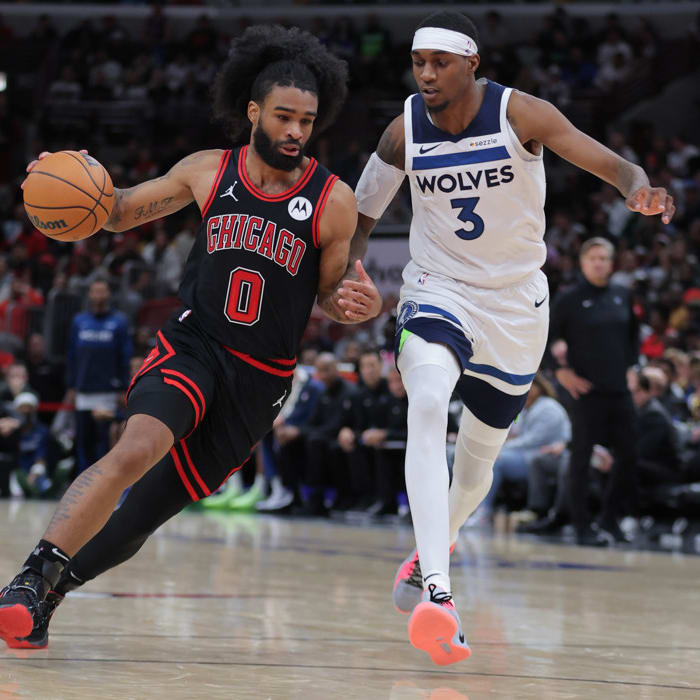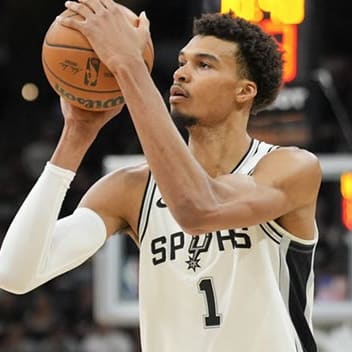This article is part of our NBA Team Previews series.
STATE OF THE FRANCHISE
Despite Father Time knocking loudly at their door, the San Antonio Spurs continue to find ways to win, both in the regular season and in the playoffs. Another 50-win season last year was followed by an upset of the second-seeded Dallas Mavericks in the first round before the Spurs finally bowed out to Phoenix. That's the good news. The bad news is that the Spurs' core of Tim Duncan, Manu Ginobili and Tony Parker showed significant signs of breaking down last season, and none of them are getting any younger. Their struggles helped explain the Spurs' uncharacteristic 20-26 record last season against teams above .500, and the four-game sweep by the Suns. Thankfully for Spurs fans, last season also showed a glimpse of the Spurs' future. Guard George Hill may have been the fantasy breakout player of the year, going from relative obscurity to volume scorer. Rookie DeJuan Blair proved to be a steal in the second round, boasting per-minute numbers that ranked with the best power forwards in the NBA. The Spurs also added Brazilian import Tiago Splitter. Splitter, a center, was widely regarded as the best player in Europe over the past few seasons. These youngsters should make even more of an impact this season, as the older players see their roles further decrease. On most teams, such a transition may lead to the lottery. On Gregg Popovich's Spurs? Count on another 50-win season and playoff success.
PLAYING TIME DISTRIBUTION
Little should
STATE OF THE FRANCHISE
Despite Father Time knocking loudly at their door, the San Antonio Spurs continue to find ways to win, both in the regular season and in the playoffs. Another 50-win season last year was followed by an upset of the second-seeded Dallas Mavericks in the first round before the Spurs finally bowed out to Phoenix. That's the good news. The bad news is that the Spurs' core of Tim Duncan, Manu Ginobili and Tony Parker showed significant signs of breaking down last season, and none of them are getting any younger. Their struggles helped explain the Spurs' uncharacteristic 20-26 record last season against teams above .500, and the four-game sweep by the Suns. Thankfully for Spurs fans, last season also showed a glimpse of the Spurs' future. Guard George Hill may have been the fantasy breakout player of the year, going from relative obscurity to volume scorer. Rookie DeJuan Blair proved to be a steal in the second round, boasting per-minute numbers that ranked with the best power forwards in the NBA. The Spurs also added Brazilian import Tiago Splitter. Splitter, a center, was widely regarded as the best player in Europe over the past few seasons. These youngsters should make even more of an impact this season, as the older players see their roles further decrease. On most teams, such a transition may lead to the lottery. On Gregg Popovich's Spurs? Count on another 50-win season and playoff success.
PLAYING TIME DISTRIBUTION
Little should change from last year, with four of the starting spots and the sixth man spot already determined. In the backcourt, Parker and Hill should start, with Ginobili coming off the bench. All three should see roughly 30 minutes per game. If any of the three are to get hurt, expect rookie James Anderson's minutes to increase, with additional time dispersed to undrafted free agents Gary Neal and Garrett Temple. Richard Jefferson should see 30-35 minutes as well at the small forward spot, backed up by Ginobili in three-guard sets. Up front, the Spurs tried to limit Duncan to 30 minutes per game last year, and that trend should continue as he turns 35 years old this year. Splitter should take over the starting center spot, though Antonio McDyess could see up to 15 minutes a game at center, especially early in the season as Splitter gets acclimated to the NBA. Blair backs up Duncan and will see some time at center as well. Expect him to get 20 minutes a night. Three-point specialist Matt Bonner will see no more than 10, barring significant injury to those ahead of him.
PLAYER OUTLOOKS
Center:
Tiago Splitter: The Spurs drafted Splitter in 2007 and chose to let him percolate in Europe for the last three years. All he did during that time was make three All-Euroleague teams, win the Spanish League MVP, and claim a Spanish League championship. He earned these accolades with the finest array of low-post moves of any player on the international level. Those skills should serve him well in the NBA, though sharing a frontcourt with another low-post wizard in Tim Duncan could reduce Splitter's touches. Also working against Splitter is his limited rebounding ability (only 5.4 per game last year in Europe) and free-throw struggles (64%). Further complicating his fantasy potential is coach Gregg Popovich's reluctance to give new players significant playing time, as well as the presence of fellow big men DeJuan Blair and Antonio McDyess. Due to these factors, we'd suggest tempering your expectations of Splitter, at least early in the season.
Antonio McDyess: The fact that McDyess saw 50 starts and 21 minutes per game was one of the more mystifying facts of last season given the per-minute numbers posted by rookie DeJuan Blair. McDyess did little with his time, with poor numbers across the board. At the age of 36, McDyess doesn't score, rebound or block shots well anymore, and his shooting percentages leave much to be desired. The signing of Splitter and the further emergence of Blair should render McDyess obsolete by midseason.
Forward:
Tim Duncan: On the one hand, fantasy owners would generally be satisfied with averages of 18 points and 10 rebounds from a 34-year-old power forward. However, those numbers last year represented career lows for Duncan, who also posted career-worst figures in blocks. Duncan also saw a career low in minutes per game last year, as part of a strict effort to keep him fresh for later in the year and the postseason. The plan was relatively successful, as Duncan was kept to roughly 30 minutes per game, and in turn, played in all but four of the Spurs' contests. But fantasy owners should expect more diminishing returns this year. The presence of low-post ace Tiago Splitter will siphon some of Duncan's offensive touches, and minute restrictions should be even tighter. You could do worse than Duncan as your top power forward, but don't expect the Duncan of old.
Richard Jefferson: Few players had as disappointing a 2009-2010 season as Richard Jefferson. After scoring at least 18.5 points per game in six of the previous seven seasons, Jefferson's scoring fell off a cliff to 12.3 points per game, and a stunning 9.4 in the playoffs. Especially alarming to fantasy owners was Jefferson's three-point percentage. Threes used to be Jefferson's specialty, but last year he shot a paltry 32 percent from behind the arc. Past scoring, Jefferson has never brought much to the table. He's not an exceptional rebounder, he doesn't pick up many steals, and his free-throw shooting is only mediocre. While the possibility exists that he may improve a little this year, last season's numbers should scare you away from Jefferson on draft day.
DeJuan Blair: Blair only averaged 7.8 points and 6.4 rebounds last season. So why were fantasy owners so excited about him? Because he did so in only 18.7 minutes per game, and showed glimpses of huge potential when given the rare opportunity to play starter's minutes. A 28-point, 21-rebound game against Oklahoma City, as well as a 27-23 performance on the season's final day made Blair a veritable fantasy tease. Sadly, Blair's hopes for starter's minutes don't look much brighter this year. Tim Duncan is entrenched at power forward, and Tiago Splitter was signed to start at center. Still, Blair should at the very least see an increase in minutes, and if Splitter or Duncan is injured, Blair should be your first waiver wire pickup.
Matt Bonner:Matt Bonner shoots threes, as a staggering 62 percent of Bonner's shot attempts last year were behind the three-point line. Past his three-point shooting skill, Bonner does little else, and won't see nearly enough playing time to contribute in any other category.
Alonzo Gee: Gee was named the NBDL's Rookie of the Year last season, with 21.0 points and 6.6 rebounds per game on 51 percent shooting for the Austin Toros. Those numbers should earn him a spot on San Antonio's roster this season, but he faces an uphill climb for fantasy-worthy playing time.
Guard:
Tony Parker: Parker is entering a contract year. This factoid will almost certainly be the first thing that people mention when discussing Parker this year, especially as the Spurs have been noncommittal about retaining him. Parker didn't help his negotiating leverage last season, missing 26 games and posting some of the worst scoring, assist, field goal and steal numbers of his career when he was healthy. The points are especially concerning, as Parker's scoring dropped from 22.0 per game to a middling 16.0, especially for a point guard who doesn't pick up many assists. Worse, George Hill emerged in Parker's absence as an elite-level point guard. We see Parker's role slowly reducing this year, especially if the team decides they don't want to re-sign him.
George Hill: Hill entered the 2009-2010 season as a little-used backup who flashed occasional potential. He enters this season as the Spurs' point guard of the future, and possibly the present. When starter Tony Parker was sidelined with injury, Hill stepped up in a big way, shooting 49 percent from the field and scoring 15.3 points per game. This season, Hill, Parker and Manu Ginobili should share offensive touches, but you could end up seeing Hill start to overshadow Parker by season's end as the team prepares for the future. Strangely enough, Hill's fault as a point guard is similar to Parker's – a lack of decent assist numbers. He averaged a paltry 2.9 per game, and only 3.6 as a starter. But we expect that statistic to be one of many to increase as Hill is slowly handed the keys to the offense.
Manu Ginobili: Ginobili started slow last season, but he picked up his play when Tony Parker was sidelined. This late-season surge brought Ginobili's averages to a Manu-like 16.5 points per game with 87 percent free-throw shooting, as well as a career-best 4.9 assists per game. Ginobili gives you significant production coming off the bench (23 points+rebs+assists), and All-Star numbers when he starts (30.9). Ginobili also now has contract security, signing a three-year extension that will keep him in San Antonio until the age of 36. Expect another big year from Manu.
James Anderson: Anderson gives the Spurs another scorer out of the backcourt. He averaged 22.3 points per game for Oklahoma State in a competitive Big 12 and grabbed an impressive 5.8 boards per contest as well. He faces an uphill battle for playing time in San Antonio though, especially as a rookie learning coach Gregg Popovich's system. Anderson has potential, but he'll spend this year paying his dues.
Garrett Temple: Temple impressed coaches during a series of 10-day contracts last year, even earning a start late in the season. He is the favorite to earn the team's final roster spot this year, but should provide little fantasy contribution.
Sleeper:
DeJuan Blair: Per 36 minutes, Blair averaged 15.6 points and 12.7 rebounds, near All-Star level in only his rookie year. We expect Blair to see more minutes this year, which should in turn lead to excellent numbers.
Bust:
Tony Parker: With George Hill's emergence, the Spurs could slowly phase out Parker and give Hill more playing time as the season continues. If the team decides that Hill is the point guard of the future, Parker may be deemed expendable.








